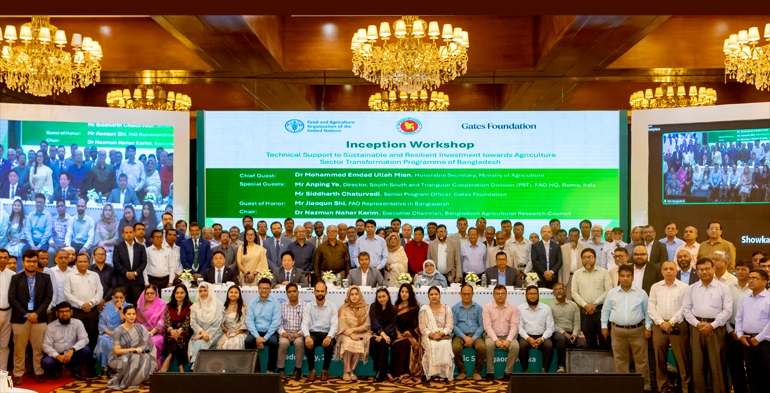
Agrilife24.com: The Ministry of Agriculture (MoA), in collaboration with the Food and Agriculture Organization of the United Nations (FAO) and with financial support from the Gates Foundation, officially launched the “Technical Support to Sustainable and Resilient Investment Towards Agriculture Sector Transformation Programme (AsTP)” today 23rd July 2025 at a high-level inception workshop held at the Pan Pacific Sonargaon, Dhaka.
The AsTP project marks a major milestone in Bangladesh’s journey to modernize its agriculture sector and enhance sustainability, resilience, and productivity in the face of growing global and local challenges. The initiative, which falls under the Government’s broader Agriculture Transformation Programme (ATP) is designed to catalyze systemic change through evidence-based planning, targeted regional investment, and strengthened institutional capacity.
Endorsed by the Economic Relations Division of the People's Republic of Bangladesh in March 2025 and approved by the Executive Committee of the National Economic Council (ECNEC) in April 2025, the project will be implemented by FAO, with the Bangladesh Agricultural Research Council (BARC) serving as the lead executing agency. Key collaborating government institutions include the Department of Agricultural Extension (DAE), Bangladesh Agricultural Development Corporation (BADC), Bangladesh Agricultural Research Institute (BARI), and Bangladesh Rice Research Institute (BRRI). The project demonstrates strong strategic alignment with national agricultural priorities, such as the Bangladesh Delta Plan 2100 and the National Agriculture Policy 2018.
The inception event was graced by Dr. Mohammad Emdad Ullah Mian, Hon’ble Secretary, Ministry of Agriculture, as Chief Guest. Distinguished guests included Anping Ye, Director, South-South and Triangular Cooperation Division, FAO Headquarters (HQ), Siddharth Chaturvedi, Senior Program Officer, Gates Foundation; and Jiaoqun Shi, FAO Representative in Bangladesh. The event was chaired by Dr. Nazmun Nahar Karim, Executive Chairman of BARC. Over 150 participants from government institutions, development partners, private sector entities, academia, and civil society organizations took part in the event.
Dr. Emdad Ullah Mian, Secretary of MoA, talked about Bangladesh’s priorities for its agricultural transformation in his remarks. He stated, “The AsTP project comes at a crucial time as Bangladesh redefines its agricultural priorities ahead of LDC graduation. It will help us align national policy with evidence, invest strategically, and empower institutions to deliver.”
Anping Ye, Director, South-South and Triangular Cooperation Division, FAO HQ, in his remarks, stated, “The AsTP project truly reflects the heart of what South-South and Triangular Cooperation Division stands for — mutual learning, co-creation, and adapting proven solutions to fit local realities. By working closely with Bangladesh to tailor innovations that are globally informed, regionally relevant, and locally actionable, this project is turning knowledge into real, lasting impact.”
Jiaoqun Shi, FAO Representative in Bangladesh, emphasized on FAO’s continuous collaboration with the Government to achieve the anticipated agricultural transformation for the country. He said, “The AsTP project is more than a partnership — it's a bold step toward transforming agriculture in Bangladesh. With the Government of Bangladesh, FAO, and the Gates Foundation united, we’re not just solving today’s challenges — we’re shaping a sustainable future. Aligned with the National Agriculture Policy 2018, the Delta Plan 2100, and the PARTNER programme, AsTP is driving long-term, systemic change”
The AsTP project is structured around three interconnected components. The first focuses on strengthening evidence-based agricultural planning by applying FAO’s Monitoring and Analysing Food and Agricultural Policies (MAFAP) framework to optimize public expenditure and guide investment decisions. The second component aims to develop inclusive, climate-resilient regional investment plans across six agro-ecological zones through stakeholder consultation, environmental diagnostics, and resource mobilization strategies. The third component promotes innovation and institutional strengthening by piloting cutting-edge technologies—such as IoT-based systems, Global GAP alignment, and digital agriculture tools—and leveraging global knowledge through South-South and Triangular Cooperation (SSTC).
The workshop provided a platform for technical dialogue and stakeholder alignment. Sessions included presentations on the project's components and objectives, followed by a high-level panel discussion on translating vision into action through evidence, investment, South-South and Triangular Cooperation, and institutional readiness. Participants reaffirmed their commitment to advancing agricultural transformation through coordinated, inclusive, and data-driven approaches.
By fostering innovation, mobilizing investment, and enhancing institutional capacity, the AsTP project is poised to accelerate Bangladesh’s agricultural transformation and contribute to its broader development goals. FAO, in partnership with the Government of Bangladesh and national stakeholders, remains dedicated to ensuring a Better Production, Better Nutrition, a Better Environment, and a Better Life for all.
























